
Photo Gallery
Our visually stunning production, artfully captured in evocative photos by Kathleen Behnke
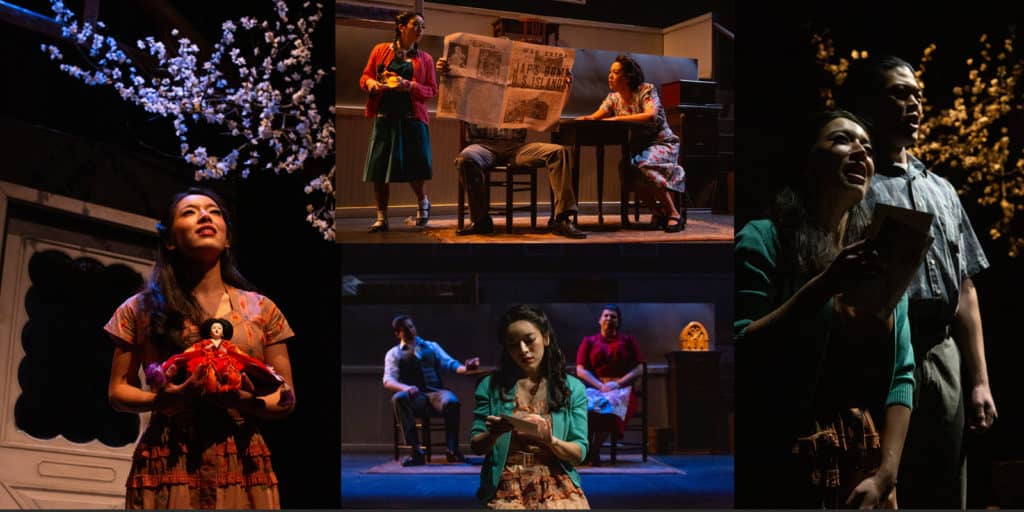
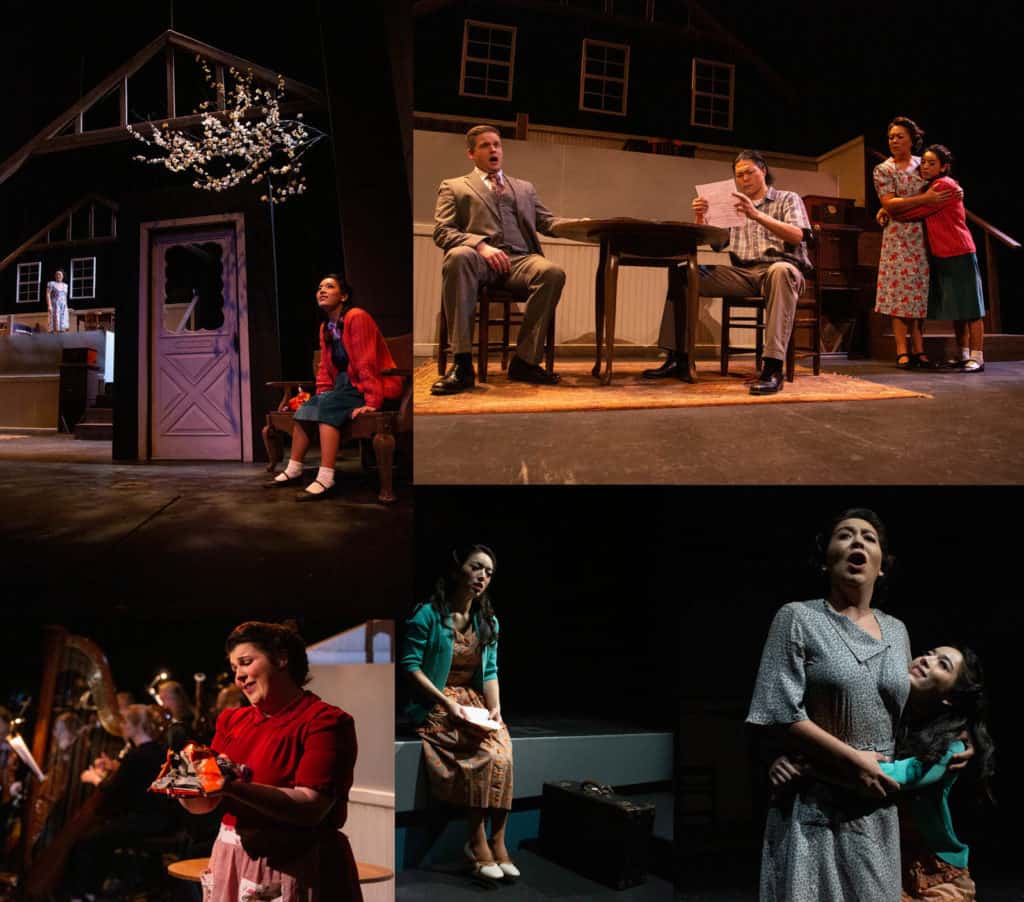
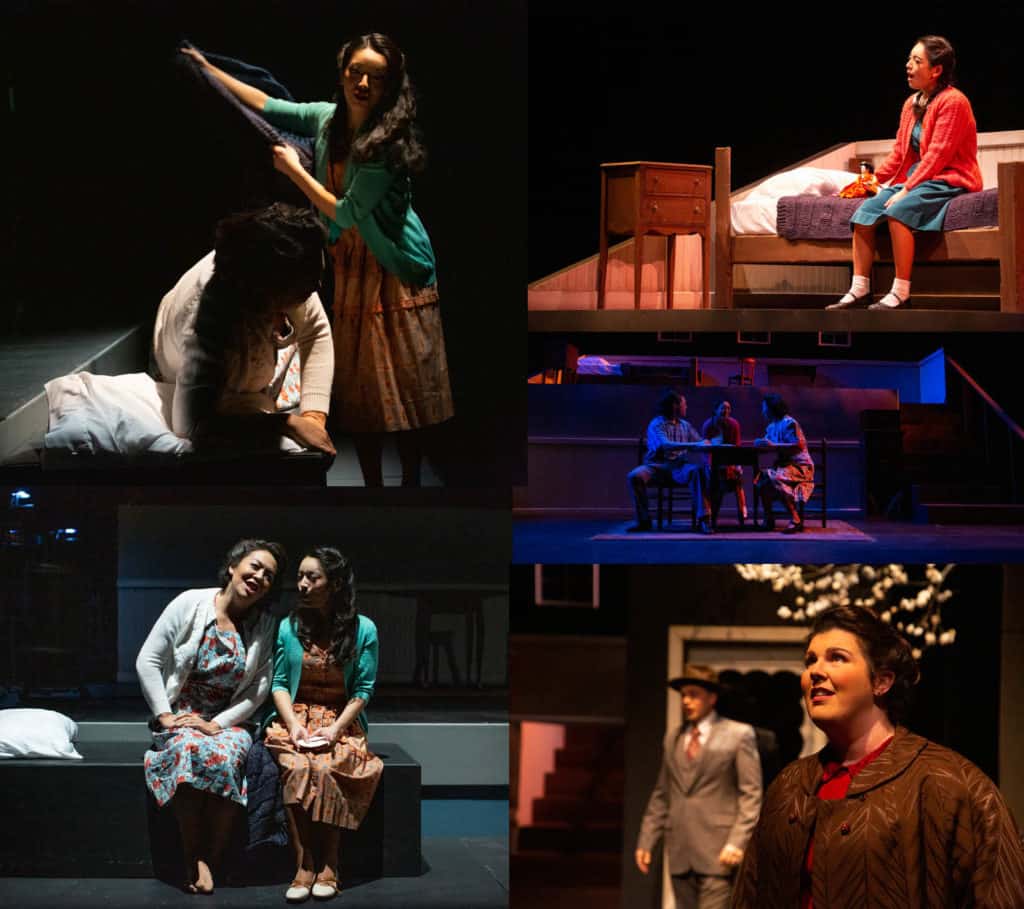
Performance Dates
Friday, February 15, 2019 @ 8:00 PM – Sydney Laurence Theatre in the Alaska Center for the Performing Arts
Saturday, February 16, 2019 @ 8:00 PM – Sydney Laurence Theatre in the Alaska Center for the Performing Arts
Sunday, February 17, 2019 @ 4:00 PM – Sydney Laurence Theatre in the Alaska Center for the Performing Arts
In English with English titles
ALL Ticket holders: Take the An American Dream Audience Survey by Feb 25, 2019 and be entered to WIN two (2) tickets to a Metropolitan Opera HD Broadcast at Century 16 in Anchorage (Courtesy of KLEF FM 98.1) Various dates and shows available to choose from. To take the survey CLICK HERE
About the Opera
Treasured possessions are symbols of home; reminders of a past never to be repeated
by Jack Perla
Libretto by Jessica Murphy Moo
An experience you’ll never forget, based on events never to be forgotten. The Alaska premiere of this modern masterpiece, is set in the wake of Pearl Harbor, and the executive order authorizing the internment of Japanese Americans. This eloquent, gripping piece of musical theater relates poignantly to present day events, with local connections to our Japanese, Jewish and Alaska Native communities.
Inspired by true stories from American history, the opera explores intersecting narratives of two women during World War II: a Japanese American, and her family, facing internment, and a German Jewish immigrant preoccupied by those she left behind. Both families have secrets that bind them to each other, eventually revealed through treasured possessions abandoned and found.
Cards placed on each theater seat tell the story of one incarcerated soul in Alaska and “Prelude to the Opera” Alaskan community speakers, who were themselves ‘relocated’ to WWII internment camps, help set the stage for the opera before the curtain rises, personalizing it, shining a spotlight on our Japanese and Alaska Native communities, and ‘bringing it home’ for all Alaskans.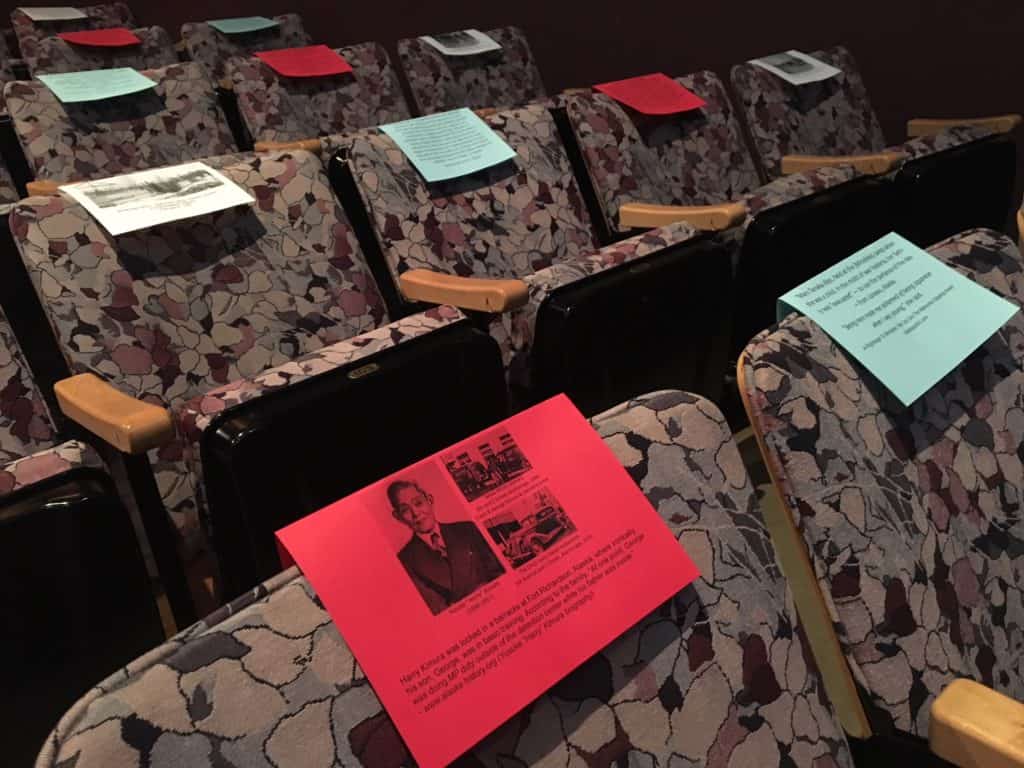
An exhibition and informational materials from Anchorage organizations dedicated to fighting discrimination and promoting unity (including the Japanese American Citizens League, Japan Alaska Association, Alaska Jewish Museum, Aleutian Pribilof Islands Association, Welcoming Anchorage, YWCA, Bridge Builders of Anchorage, ACLU, Mayor’s Office, National Park Service, Alaska Humanities Forum & more) will be on display in Voth Hall before and after the performance (funded in part by Rotary Club of Anchorage East)
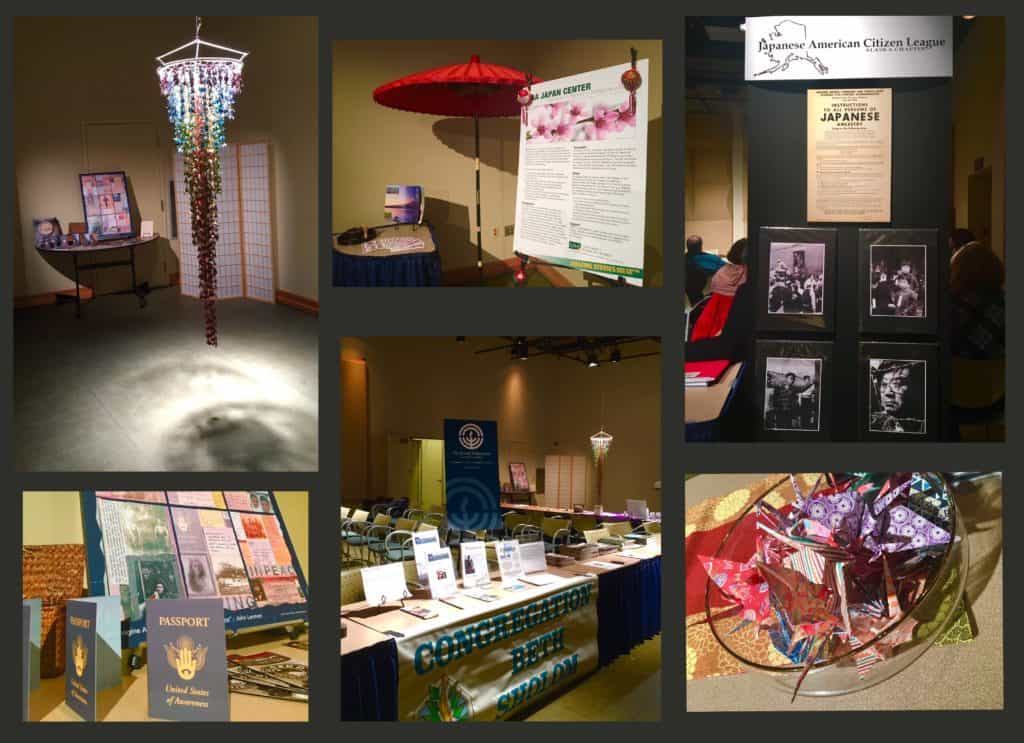

Intended to foster conversations, we invite you to linger after each show for a “Talk Back” with the Composer / Conductor, Jack Perla, the cast, the artistic team, and “Prelude to the Opera speakers, and community representatives to discuss the production, social issues raised by the work and its themes of wartime hysteria, racism and xenophobia.
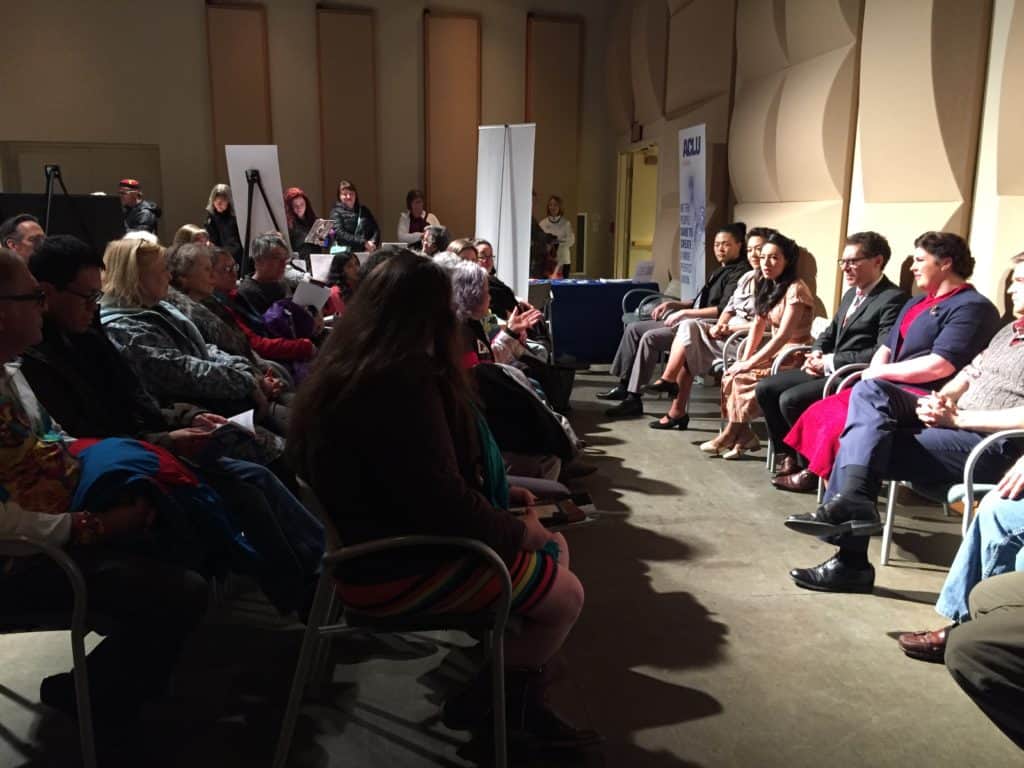
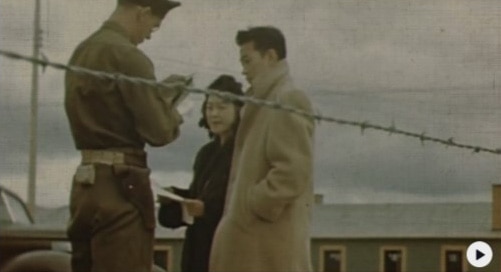
WATCH VIDEO>> Japanese-American Relocation After the attack on Pearl Harbor, the United States Government issued executive order 9066, which empowered the military to round up anyone of Japanese ancestry and place them in internment camps.
Alaska’s Internment Camp History
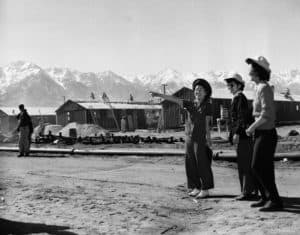
‘Alaska’s Forgotten Japanese Internment Camp Rediscovered’ – History Channel, by Christopher Klein, Feb 29, 2016

Camp construction at Fort Richardson, 1942 (Courtesy of Dr. Morgan Blanchard, Northern Land Use Research Alaska)
‘Japanese community recalls JBER internment camp’, by Zachariah Hughes, Alaska Public Media – February 22, 2016
Read article>>>
‘Study of little-known WWII internment camp in Alaska revives difficult memories’ – LA Times, Feb 2016
Read article>>>
“The Empty Chair” – Feature length documentary film by Greg Chaney that recounts the forced removal and incarceration of Japanese Americans from Juneau, Alaska, during World War II.
Watch trailer>>>
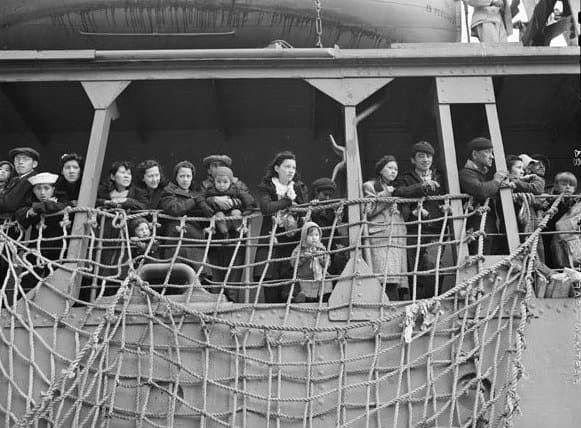
Pribilof Island residents evacuated on U.S. Army Transport Delarof, in June 1942.
National Archives, General Records of the Department of the Navy
ALEUT STORY, narrated by Martin Sheen, is a poignant and timely film about one of the least known chapters of the American civil rights experience. After Japan invaded the western Aleutian islands in 1942, the U.S. government sent hundreds of Aleut Americans to abysmal and isolated internment camps in southwest Alaska. An estimated ten percent of the men, women and children sent to the camps would die there—a death rate comparable to that suffered by Americans in foreign prisoner of war camps.
Watch trailer>>>
‘The Other WWII American-Internment Atrocity’ – NPR, February 21, 2017
Read article>>>
‘Agony of the Aleutians: The forgotten internment’ – Anchorage Daily News, September 28, 2016
Read article>>>
Alaska’s Aleuts–Forgotten Internees of WWII : Captivity: Residents of strategic islands were rounded up by U.S. government in 1942 and left to languish in old fish canneries. March 01, 1992|JULIA RUBIN | ASSOCIATED PRESS
Read article>>>
An American Dream in reviews
“a heart wrenching opera…eloquent and moving” – Seattle Times
“It’s a triumph. It’s riveting. It’s unsettling and uncomfortable. It’s strong. For many it will be emotional… “…an atmospheric score which surrounds but never overwhelms the voices….”The whole was a tour de force…” City Arts Magazine
“A cumulative experience in which music plays but one part…a prime example of “people’s music” that tackles a formerly uncomfortable subject with honesty and whose ultimate impact relies, in large part, on non-musical components that are anything but ancillary.” – Classical Voice America
“Full of impressionist and minimalist impulses, with washes of color and repeated motoric elements, it sounded like a meeting of Debussy and Philip Glass. Jessica Murphy Moo’s heart-wrenching, poetic libretto got right to the point in an opening scene with a Japanese-American family hastily burning belongings in the hope of avoiding arrest…An American Dream is a gripping piece of musical theater” – Seattle Times
“The star of the show, however, was Yeonji Lee, who had the most dramatic opportunities to show off her character’s range – from an angry, naïve young girl to an angry, sorrowful young woman. Lee’s beautiful, stentorian soprano went from baby- talking her doll and arguing with her parents, to demanding of Jim Crowley that he remove the blindfold of racism and see Setsuko clearly as a human being.” – Seattle Gay News
About the Composer
 Beginning in New York with his group Music Without Walls and continuing in San Francisco, Jack Perla has forged a reputation for his unique cross-fertilization of jazz, improvisation and classical music. He’s been commissioned by the Los Angeles Opera, Opera Theatre St. Louis, Houston Grand Opera, Seattle Opera, The Paul Dresher Ensemble, TwoSense, MATA, and many others. Jack’s latest opera Shalimar the Clown, based on the novel by Salman Rushdie, premiered in June 2016 at Opera Theater St. Louis. Rajiv Joseph, nominated for a Pulitzer Prize for Bengal Tiger at the Baghdad Zoo, wrote the libretto, and James Robinson, one of America’s most sought-after directors, led the production. The Wall Street Journal called Shalimar the Clown “topical, literary and theatrical”; The New York Times: “genuinely out-of-the-box composing”; The Chicago Tribune: “the dramatic resonance of modern Shakespearean tragedy” and Opera News: “the finesse of Puccini”. An American Dream, a one-act opera with libretto by Jessica Murphy-Moo received its world-premiere with Seattle Opera in August 2015. The Seattle Times called it “a gripping piece of musical theater”. The San Francisco Chronicle called Jack’s 2014 opera River of Light “a subtly cross-pollinated marvel”. Jack is the recipient of awards from the Thelonious Monk Institute, American Composers Forum, New Music USA, Barlow Endowment for Music Composition, Argosy Foundation, James Irvine Foundation, Paul Mellon Foundation, Civic Orchestra of Chicago, Yaddo and the MacDowell Colony. Jack grew up in Brooklyn and lived in New York City while attending NYU and the Manhattan School of Music. After MSM he formed Music Without Walls, featuring violinist Mark Feldman, woodwind virtuosos Rob DeBellis and Marty Ehrlich, cellist Erik Friedlander, percussionist Kory Grossman and bassist John Goldsby. Perla led the group through several seasons of New York area concerts before heading west to the Bay Area in 1996, where he established the West Coast edition of the group. He earned his DMA in composition from the Yale School of Music, where he studied with Jacob Druckman, Martin Bresnick and Lukas Foss. He earned his BM and MM from the Manhattan School of Music, where he studied with John Corigliano, and his BA from New York University. He currently lives and works in San Francisco.
Beginning in New York with his group Music Without Walls and continuing in San Francisco, Jack Perla has forged a reputation for his unique cross-fertilization of jazz, improvisation and classical music. He’s been commissioned by the Los Angeles Opera, Opera Theatre St. Louis, Houston Grand Opera, Seattle Opera, The Paul Dresher Ensemble, TwoSense, MATA, and many others. Jack’s latest opera Shalimar the Clown, based on the novel by Salman Rushdie, premiered in June 2016 at Opera Theater St. Louis. Rajiv Joseph, nominated for a Pulitzer Prize for Bengal Tiger at the Baghdad Zoo, wrote the libretto, and James Robinson, one of America’s most sought-after directors, led the production. The Wall Street Journal called Shalimar the Clown “topical, literary and theatrical”; The New York Times: “genuinely out-of-the-box composing”; The Chicago Tribune: “the dramatic resonance of modern Shakespearean tragedy” and Opera News: “the finesse of Puccini”. An American Dream, a one-act opera with libretto by Jessica Murphy-Moo received its world-premiere with Seattle Opera in August 2015. The Seattle Times called it “a gripping piece of musical theater”. The San Francisco Chronicle called Jack’s 2014 opera River of Light “a subtly cross-pollinated marvel”. Jack is the recipient of awards from the Thelonious Monk Institute, American Composers Forum, New Music USA, Barlow Endowment for Music Composition, Argosy Foundation, James Irvine Foundation, Paul Mellon Foundation, Civic Orchestra of Chicago, Yaddo and the MacDowell Colony. Jack grew up in Brooklyn and lived in New York City while attending NYU and the Manhattan School of Music. After MSM he formed Music Without Walls, featuring violinist Mark Feldman, woodwind virtuosos Rob DeBellis and Marty Ehrlich, cellist Erik Friedlander, percussionist Kory Grossman and bassist John Goldsby. Perla led the group through several seasons of New York area concerts before heading west to the Bay Area in 1996, where he established the West Coast edition of the group. He earned his DMA in composition from the Yale School of Music, where he studied with Jacob Druckman, Martin Bresnick and Lukas Foss. He earned his BM and MM from the Manhattan School of Music, where he studied with John Corigliano, and his BA from New York University. He currently lives and works in San Francisco.
More info about Jack Perla: CLICK HERE
About the Librettist
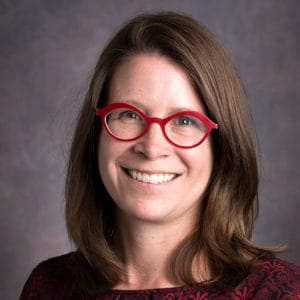 Jessica Murphy Moo (Librettist) earned great acclaim for her collaboration with Jack Perla, An American Dream, at its Seattle Opera world premiere in 2015 and its reprise there two years later. The opera will be produced at the Lyric Opera of Chicago this spring. Chicago Lyric and Seattle Opera have also co-commissioned Murphy Moo to write a libretto for young audiences to be performed in schools and for the community during the 2019/20 season. Murphy Moo was recently appointed editor of Portland magazine, the award-winning publication of the University of Portland. She is former senior communications manager for Seattle Opera, as well as an adjunct instructor teaching nonfiction writing for the University of Washington’s Professional and Continuing Education division. Murphy Moo was formerly a staff editor at The Atlantic and fiction editor at Memorious, an online literary magazine. Her fiction has appeared in The Atlantic, Image, Memorious, and Signs of Life, an anthology for Seattle-based writers. Her nonfiction has appeared in Portland magazine, Poets & Writers Magazine, ParentMap, The Tablet, Boston College Magazine, and The Atlantic Online, among other publications. Murphy Moo was a 2016 fellow at Tapestry Opera’s Librettist Composer Laboratory Workshop and is currently working on a new libretto for an opera for young audiences. She is an alumna of the College of the Holy Cross and Emerson College. Murphy Moo has held teaching positions at Emerson College, Harvard University, Boston University, Seattle Pacific University, University of Washington, and Seattle Opera.
Jessica Murphy Moo (Librettist) earned great acclaim for her collaboration with Jack Perla, An American Dream, at its Seattle Opera world premiere in 2015 and its reprise there two years later. The opera will be produced at the Lyric Opera of Chicago this spring. Chicago Lyric and Seattle Opera have also co-commissioned Murphy Moo to write a libretto for young audiences to be performed in schools and for the community during the 2019/20 season. Murphy Moo was recently appointed editor of Portland magazine, the award-winning publication of the University of Portland. She is former senior communications manager for Seattle Opera, as well as an adjunct instructor teaching nonfiction writing for the University of Washington’s Professional and Continuing Education division. Murphy Moo was formerly a staff editor at The Atlantic and fiction editor at Memorious, an online literary magazine. Her fiction has appeared in The Atlantic, Image, Memorious, and Signs of Life, an anthology for Seattle-based writers. Her nonfiction has appeared in Portland magazine, Poets & Writers Magazine, ParentMap, The Tablet, Boston College Magazine, and The Atlantic Online, among other publications. Murphy Moo was a 2016 fellow at Tapestry Opera’s Librettist Composer Laboratory Workshop and is currently working on a new libretto for an opera for young audiences. She is an alumna of the College of the Holy Cross and Emerson College. Murphy Moo has held teaching positions at Emerson College, Harvard University, Boston University, Seattle Pacific University, University of Washington, and Seattle Opera.
Synopsis
AMERICA, THE 1940S
March 1942
A farmhouse on a Puget Sound island. An American veteran, Jim Crowley, and Eva, his new wife, have come to buy a home. A German Jew, Eva desperately wants her parents to leave Germany, where their lives are in danger. She hopes her family will find peace and sanctuary in this place so far from the war. Meanwhile, inside the home, a Japanese American family has heard that the FBI has been searching homes and arresting people of Japanese descent. The family burns their precious Japanese belongings, attempting to erase all ties to Japan in the hopes that they will avoid arrest.
Eva waits outside as Jim, knowing he has the upper hand, tries to get Makoto Kobayashi to sell the land for a fraction of what it is worth. The FBI arrives at the home and tells Makoto he is under arrest; the FBI found some old dynamite in the shed out back, and they say this contraband makes him a threat. Makoto decides, under the pressure of the situation, to sell the land to Jim. As the FBI agents take Makoto away, he and his teenage daughter, Setsuko, promise to meet at the farmhouse, the only home they know, after the war.
May 1942
Setsuko and her mother, Hiroko, have packed up the house. Setsuko holds her suitcase, ready to leave, when a postman delivers a letter. Setsuko sees that it is from Germany, for a woman named Eva. Angry that she is being forced to leave her home, the girl steals the letter.
A few weeks later
Jim and Eva move into their new home; they designate a room for Eva’s parents. Jim tries to keep Eva’s hopes up. Eva notices that small items have been left behind in the home: a piece of a record and a photograph. When she finds a beautiful Hina-Matsuri doll hidden beneath a floorboard, Eva asks Jim about the previous owners. Jim tells her that they were “Japs,” sent to the internment camps. He tells her to throw away the doll, that it doesn’t belong in a room for her parents. Eva defies Jim’s wishes and hides the doll, promising to find its owner and return it at war’s end.
May 1945
Jim and Eva hear an announcement on the radio of Germany’s surrender. Eva, who has learned about the Kobayashi family and their whereabouts, writes to Setsuko, telling Setsuko she has something that belongs to her.
Later that month
While still incarcerated, Setsuko receives the letter. When her mother, who is gravely ill, inquires about the letter, Setsuko lies and explains that the letter is from her father, telling them to keep hope because the war is nearly done.
August 1945
Puget Sound Farmhouse. When a letter comes back to Eva from Setsuko, Jim intercepts it and tells Eva that Setsuko is not allowed in their home. President Truman announces the dropping of the atomic bomb.
September 1945
There is a knock on the door. It is Setsuko, returning to the home. Setsuko confronts Jim, reminding him that he coerced her family to sell their home for next to nothing. Eva asks Jim if this is true.
Jim tries to explain his actions to Eva, but she can’t accept what he has done. She leaves the room to retrieve the doll she has promised to return to Setsuko. While she is gone, Jim confronts Setsuko, and Setsuko admits to another reason for coming. She is here to return Eva’s letter. Eva returns to the room, and Setsuko gives her the letter. From the stolen letter, Eva learns of her parents’ fate, and she collapses. Setsuko must finish reading the letter for her. Jim tries to comfort Eva. Setsuko’s father arrives at the front door.
(synopsis courtesy of OPERA America website)
Sponsors & Partners
This production made possible by an OPERA America Innovation Grant, supported by the Ann & Gordon Getty Foundation.


In Loving Memory

This production is dedicated with love and gratitude to Florence Rooney (1938-2018)
To learn more about the Anchorage Opera Board of Trustees $5000 Florence Rooney Memorial Challenge CLICK HERE
The Cast
Production Team

Yeonji Lee – Setsuko Kobayashi

Hidenori Inoue – Papa, Makoto Kobayashi

Elizabeth Baldwin – Eva Crowley

Nina Yoshida Nelsen – Mama, Hiroko Kobayashi

Andrew Paulson – Jim Crowley

Jack Perla – Conductor

Carrie Yanagawa – Set Designer

Cedar Cussins – Lighting Designer

Emily Butzi – Stage Manager

Cara Consilvio – Stage Director

Elle Janecek – Hair & Make-up Designer

Richard Gordon – Rehearsal Accompanist
Free Pre-Opera Talks
Plan to join us one hour before each performance of An American Dream to learn the fascinating history and insights into this poignant and compelling opera.
Friday, Feb 15 at 7:00 pm in the Voth Hall
Saturday, Feb 16 at 7:00 PM in the Voth Hall
Sunday, Feb 17 at 3:00 pm in the Voth Hall


